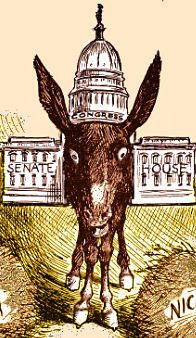 Everyone knows until some smart guy comes and confuses them. Sometimes he is just a pompous ass out to score clever points, but other times Socrates is showing us that we are the asses.
Everyone knows until some smart guy comes and confuses them. Sometimes he is just a pompous ass out to score clever points, but other times Socrates is showing us that we are the asses.
We think we know something we do not. The faux-Socrates spends his time showing regular folks their ignorance, but the real Socrates spent his time showing up rulers. There is harm in anyone believing he has knowledge when he does not, but there is great harm when a powerful person is ignorant, but thinks he knows.
The true Socrates will doubt everything, even whether he should be doubting everything. The pompous ass will always have something he will not consider and is easily offended.
We can learn something from Socrates on knowledge and our rulers in Plato’s Theaetetus, if mayhap we have rulers that are ignorant but think they know.
The dialogue starts:
Are you only just come from the country, Terpsion? Or have you been here for some time?
If you can, read Theaetetus and see that things get very difficult from these simple questions. But let’s not plunge into the birth of epistemology (the study of how we know) until we pause over the weird way the dialogue begins. There is something small, but important to learn for today in these first questions.
Terpsion and Euclides are discussing a dying warrior, Theaetetus (we are done with new Greek names). As a young man, Socrates has pointed him out as a promising lad based on a conversation Socrates had with him as a boy. Euclides just “happens” to have a book with him where he has recorded the conversation so he could have “pretty much the whole conversation in writing.”
Terpsion will listen to Euclides read about Socrates and Theaetetus. He will “know” what they said based on the record Euclides made and confirmed with Socrates.
He has waited in the city all day for Euclides to come and now he will listen and “learn” about knowing. He has come from the country, waited a long time, only to get a rehashed discussion.
This is disappointing. If you are paying, it is fraud.
Terpsion may have heard some new ideas at the end of listening, but he will not know until he engages with the ideas for himself. Imagine coming a long way, spending a great deal of time and then only hearing canned stuff.
Imagine.
Sadly, we do not have to imagine as this is the experience of too many students. Knowing cannot come from mere books, but has to be lived. The books are for conversation and not just listening. This brings us to rulers (administrators) who think they are smart. Do they listen or do they lecture? Are they worth the trip and the wait or can you get the same stuff for free from their slick homepage?
A real Socrates wishes to dialog with any person who also wishes to learn. The faux-Socrates wishes a mic-drop moment. He comes, he speaks, he conquers, but nobody is educated and nobody learns or knows. Modern philosophers have been fascinated by Theaetetus, but perhaps we should wonder if this sort of philosophical play is sterile and if the “preface” to the dialogue (which we ignore) is a warning to us.
God forgive my mic-drop moments. God help me to listen, learn, and present what God is saying today and not just a “tape” from yesterday.
—————————————-
Plato is the greatest philosopher outside of Christendom. Reject him or accept him, nobody ignores him. This summer I will be looking at the first lines of all of his dialogues. Because he carefully crafted his dialogues, the first line often contain clues to the meaning of what will come next. I have written about how to read Plato in When Athens Met Jerusalem and The Great Books Reader. I tried my hand at Platonic myth making in Chasing Shadows.
Apology begins with the persuasiveness of crowds and the need for the elite to listen. Euthyphro tells us to avoid being a jerk for justice. We must be strong to finish what we start or we become Crito and face death with our eyes wide open as Phaedo shows Socrates did. Cratylus demonstrates that words are . . .interesting. The Theaetetus teaches us how to know.











